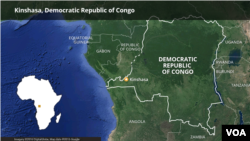A large-scale United Nations program to halt deforestation in the Democratic Republic of Congo, home to the world’s second-largest rainforest, is harming local communities and failing to protect forests, land rights researchers said on Wednesday.
The U.S.-based group Rights and Resources Initiative (RRI) called on the World Bank to withhold funding from 20 current or pending projects in the province of Mai-Ndombe, which has been a test case for a U.N.-backed conservation scheme known as REDD+.
In an area rife with land conflict, an RRI report said the forest protection projects in this western province threatened the rights and incomes of rural women and indigenous groups, including about 73,000 pygmies.
“REDD+ was created to both halt deforestation and benefit local communities — yet the current projects in Mai-Ndombe fail to address both objectives,” said Marine Gauthier, the report’s author.
A spokesman for the U.N.'s REDD+ program did not respond to requests for comment.
One of the focal cases involves U.S. company Wildlife Works Carbon (WWC), which denied the accusations.
The company obtained a large land concession in order to protect a forest from loggers, and uses a share of the money earned from selling carbon credits to benefit people living there, said president Mike Korchinsky.
“Millions of dollars of benefits have gone to the communities,” he told the Thomson Reuters Foundation. He said WWC had built schools, invested in medical clinics, and provided years of agricultural support.
But Gauthier said local communities, which signed agreements with the company, were not properly consulted, and claimed the project had hindered their farming and other activities.
“These communities actually bear the burden of reducing deforestation,” she said.
The World Bank said the funding provided by REDD+ and its partners supported some of the poorest Congolese citizens, while contributing to meeting climate goals.
“We will review the report’s findings and have no plans to withhold funding at this time,” a World Bank spokesperson said in emailed comments.
“The work improves livelihoods, lessens pressure on native forests and reduces emissions of greenhouse gases from deforestation and forest degradation,” the World Bank said. RRI said women and minorities had been worst affected by the REDD+ projects that were up and running, because they often lack formal land rights and are not consulted about decisions.
REDD+, or reduced emissions from deforestation and degradation, was one of the solutions to climate change laid out in the 2015 Paris accord. It offers monetary incentives to scale back deforestation.
Congo could become the first country to sign a REDD+ deal with the World Bank this year, setting an example for more than 50 developing countries that plan to follow suit, said RRI.
However, it warned that deal could exacerbate conflict and set a dangerous global precedent if changes were not made. RRI said it had shared the results and that discussions with donors were underway.




